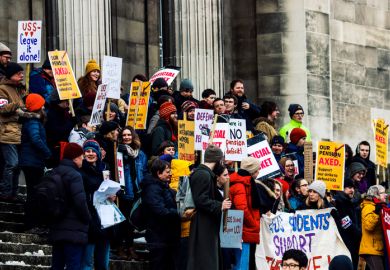Members of University and College Union, Unite and Unison and EIS are holding a third day-long walkout over the pay deal for 2013-14, which follows two two-hour strikes by UCU members in January.
Union members say the latest offer, which has been imposed by most universities, means their pay has fallen by 13 per cent in real terms since 2009 after four successive below-inflation rises.
Picket lines were in place at universities across the UK, with union members urging students not to attend lecturers or classes in solidarity with the strike.
At City University London, staff have organised a series of “teach-out” lectures in Northampton Square to raise awareness about the strike and other issues, including the sell-off of the student loan book and the links between universities and the arms trade.
Music students will also be performing protest songs by the late American folk singer and activist Pete Seeger, while staff are asking students to take part in a version of “Play Your Cards Right”, called “Pay your Staff Right”.
“Fighting for decent wages for staff is all part of providing a first-rate education for our students,” said Keith Simpson, president of City UCU.
“Our students know that this is one of the world’s most expensive cities to study and work and if we are to retain and recruit the best staff then the university cannot simply refuse to effectively cut our wages year-on-year,” he added.
Unison general secretary Dave Prentis said universities could afford to improve their 1 per cent offer as they accumulated overall surpluses of £2 billion over the past two years and given generous salary increases to vice-chancellors.
“Higher education workers have every right to be angry that wealthy universities can afford to give the highest salaried staff a generous pay rise, while the lowest paid are being forced to accept peanuts,” he said.
However, a spokesman for Universities and Colleges Employers Association, which is due to begin pay negotiations for 2014-15 next month, said there was “dwindling support” among staff for the action which was “aimed at damaging students’ education”.
“It is disappointing to see the trade unions willfully painting a misleading picture of higher education institutions’ financial conditions as part of their tactics for pay negotiations,” he said.
“The average 3 per cent increase in pay at higher education institutions last year was at the limits of affordability,” he added, saying pay and conditions for the lower paid was often better than that offered by other nearby employers.
Higher education institutions had made it clear that “there is no scope for further pay increases beyond those paid last year”, he added.
“It is time to discuss the future and higher education institutions would like see trade unions turn their attention to constructive negotiations for this year’s pay, which begin next month.”
Register to continue
Why register?
- Registration is free and only takes a moment
- Once registered, you can read 3 articles a month
- Sign up for our newsletter
Subscribe
Or subscribe for unlimited access to:
- Unlimited access to news, views, insights & reviews
- Digital editions
- Digital access to THE’s university and college rankings analysis
Already registered or a current subscriber?




